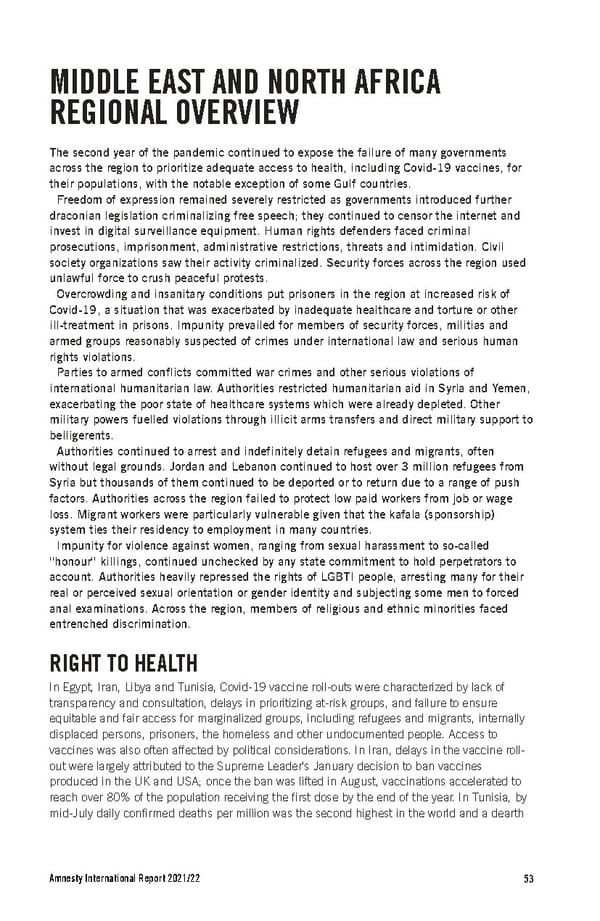MIDDLE EAST AND NORTH AFRICA REGIONAL OVERVIEW The second year of the pandemic continued to expose the failure of many governments across the region to prioritize adequate access to health, including Covid-19 vaccines, for their populations, with the notable exception of some Gulf countries. Freedom of expression remained severely restricted as governments introduced further draconian legislation criminalizing free speech; they continued to censor the internet and invest in digital surveillance equipment. Human rights defenders faced criminal prosecutions, imprisonment, administrative restrictions, threats and intimidation. Civil society organizations saw their activity criminalized. Security forces across the region used unlawful force to crush peaceful protests. Overcrowding and insanitary conditions put prisoners in the region at increased risk of Covid-19, a situation that was exacerbated by inadequate healthcare and torture or other ill-treatment in prisons. Impunity prevailed for members of security forces, militias and armed groups reasonably suspected of crimes under international law and serious human rights violations. Parties to armed conflicts committed war crimes and other serious violations of international humanitarian law. Authorities restricted humanitarian aid in Syria and Yemen, exacerbating the poor state of healthcare systems which were already depleted. Other military powers fuelled violations through illicit arms transfers and direct military support to belligerents. Authorities continued to arrest and indefinitely detain refugees and migrants, often without legal grounds. Jordan and Lebanon continued to host over 3 million refugees from Syria but thousands of them continued to be deported or to return due to a range of push factors. Authorities across the region failed to protect low paid workers from job or wage loss. Migrant workers were particularly vulnerable given that the kafala (sponsorship) system ties their residency to employment in many countries. Impunity for violence against women, ranging from sexual harassment to so-called “honour” killings, continued unchecked by any state commitment to hold perpetrators to account. Authorities heavily repressed the rights of LGBTI people, arresting many for their real or perceived sexual orientation or gender identity and subjecting some men to forced anal examinations. Across the region, members of religious and ethnic minorities faced entrenched discrimination. RIGHT TO HEALTH In Egypt, Iran, Libya and Tunisia, Covid-19 vaccine roll-outs were characterized by lack of transparency and consultation, delays in prioritizing at-risk groups, and failure to ensure equitable and fair access for marginalized groups, including refugees and migrants, internally displaced persons, prisoners, the homeless and other undocumented people. Access to vaccines was also often affected by political considerations. In Iran, delays in the vaccine roll- out were largely attributed to the Supreme Leader’s January decision to ban vaccines produced in the UK and USA; once the ban was lifted in August, vaccinations accelerated to reach over 80% of the population receiving the first dose by the end of the year. In Tunisia, by mid-July daily confirmed deaths per million was the second highest in the world and a dearth Amnesty International Report 2021/22 53
 Amnesty International Report 2021/22 Page 52 Page 54
Amnesty International Report 2021/22 Page 52 Page 54